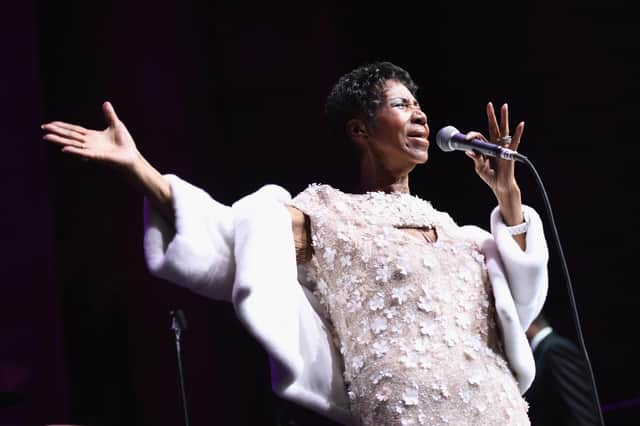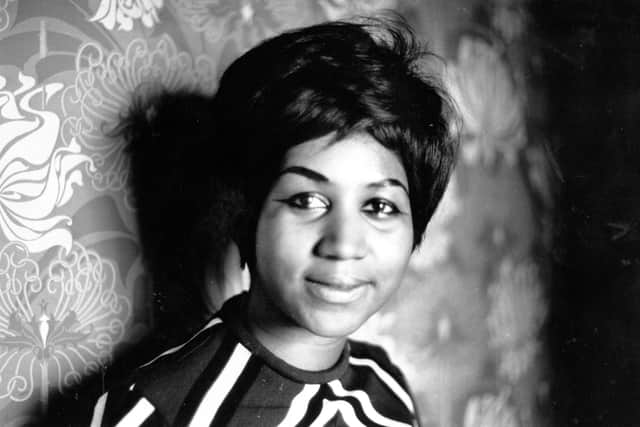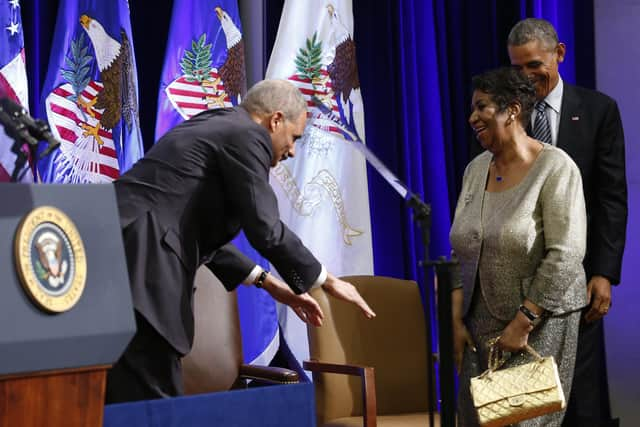Aretha Franklin film Respect tells the story of the world's greatest singer and a feminist as significant as Gloria Steinem or Germaine Greer – Susan Dalgety


The young singer is explaining how much she loves to sing, but it’s clear she is not confident about her talent.
Barbara pulls her daughter closer and looking her in the eye, tells Aretha, “You are worthy and don’t let any man tell you otherwise.”
Advertisement
Hide AdAdvertisement
Hide AdA few weeks later, Barbara died, aged 34 from a heart attack. Aretha was so distraught she refused to even talk for months, but eventually found her voice again through music… and the rest, as they say, is pop history.
Aretha Franklin may be best remembered as the world’s greatest female singer, indeed Rolling Stone magazine chose her as the top singer of all time, but she was also a leading civil rights activist and a feminist icon.
She was happy to accept her role in campaigning for civil rights. She marched in the south, sang at Dr Martin Luther King Jr’s funeral and defended the activist Angela Davis when she was arrested for conspiracy to murder (she was later acquitted).
But she was more modest about her place in the pantheon of second-wave feminists. “I think that’s Gloria Steinem’s role,” she said in a 2014 interview, “I don’t think I was a catalyst for the women’s movement. Sorry. But if I were? So much the better.”


Aretha may have been self-effacing about her role in winning respect for all women, but she was as influential as Steinem and Germaine Greer, particularly outside the rarefied atmosphere of university campuses. Far more women have danced round their handbags to Respect or belted out Natural Woman while hoovering than have read The Female Eunuch.
And in Aretha’s often tumultuous life, women saw their own battles played out. She had to contend with controlling, abusive men for much of her early life, including her father and first husband, who beat her regularly. She stood up to an industry that, until recently, regarded women as sex objects first, professional musicians second, if at all.
And she found the strength to overcome even the most terrible of events. She had her first child at 12, her second two years later, but during her lifetime never revealed who had abused her.
She took refuge in drink for a time, trying to drown her demons in wine, but found solace in the church, recording Amazing Grace, a gospel record, in 1972 against the advice of her record company. It went on to be her biggest-selling album.


Advertisement
Hide AdAdvertisement
Hide AdAnd over a 60-year career, her voice and her personality inspired everyone from Barack Obama to Annie Lennox, who famously recorded the feminist anthem Sisters Are Doin’ It For Themselves with Aretha.
As Lennox explained in a 1991 interview with Q magazine, “I woke up one morning and wrote all the words. I had a vision of it, and said to Dave [Stewart] that this idea needs a fantastic woman to sing it with. I'd thought of Tina Turner, and we contacted her but she found the content too feminist. But Aretha Franklin wanted to do it...”
More than 50 years after Aretha recorded Respect and transformed Otis Redding’s pleasant soul song into a powerful feminist anthem, it seems our society has regressed back to the 1960s.
Only a few days ago, Nicola Sturgeon was forced to condemn misogyny at First Minister’s Questions in the wake of revelations about a sexist culture in Police Scotland.
“I would say to all men in this chamber and all men across the country – challenge it if it’s on the part of other men you may know, challenge your own behaviour and then let’s collectively, as a society, turn the page and turn the corner so that women can live free of the fear of harassment, abuse, intimidation, violence and, in the worst cases, death,” she said.
Her plea may strike some as cynical, given that she didn’t call out Alex Salmond’s inappropriate behaviour during the years that she worked closely with him. Nor did she accept the need for misogyny to be classed as a hate crime, along with transphobia and racism, during the passage of the Hate Crime bill earlier this year.
But whether she is simply playing to the electoral gallery, or is genuinely “feminist to her fingertips”, the message remains the same. Women have had enough. Just as Aretha Franklin had enough of her father telling her what to sing and where to perform, we have had enough of men (and some women) defining feminism for us.
And just as she had enough of her first husband’s abuse, leaving Ted White after seven years of marriage, we have had enough of the fear, intimidation and violence that stalk far too many women’s lives. All we want is a little respect.
Advertisement
Hide AdAdvertisement
Hide AdOne of Aretha’s final performances was also one of her greatest. In December 2015, she performed Natural Woman to honour her fellow artist and friend Carole King. She was 73 years old and had been battling cancer for years.
Towards the end of the song, she left her piano, stood in front of the adoring audience, including the Obamas, threw off her trademark fur coat, and arms spread wide, sang for every women and girl across the globe. Black, white, rich, poor, disabled, gay, young, old – the power of Aretha’s voice and the depth of her soul spoke to every one of us.
She lived her life as her mother urged. “You are worthy, don’t let any man tell you otherwise.” It’s a message we should all hold dear, just as Aretha did. Sisters, it's time – once again – to ring our own bell.
A message from the Editor:
Thank you for reading this article. We're more reliant on your support than ever as the shift in consumer habits brought about by coronavirus impacts our advertisers.
If you haven't already, please consider supporting our trusted, fact-checked journalism by taking out a digital subscription.
Comments
Want to join the conversation? Please or to comment on this article.
